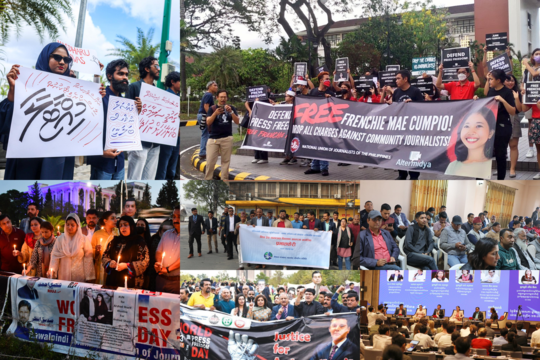The National Union of Journalists of the Philippines (NUJP) documented 60 media rights violations since May 3, 2022, with the majority stemming from incidents of harassment, libel and cyber-libel charges, death threats, and ‘red-tagging’, a practice in which journalists, media workers, unions, and others are deemed to be associated with the insurgent New People’s Army and other groups. The NUJP’s call for Tacoblan 5 journalist Frenchie Mae Cumpio’s immediate release was echoed, as the union maintains February 2022 arrest and sluggish legal processing are ill-founded and excessive. Despite a reduction in media rights violations, dangerous legislation and slow-moving police investigations into the killings of Percy Lapid and Renato Blanco are significant concerns inadequately addressed. Now more than ever, the NUJP ‘continue to insist on being free’.
In Indonesia, the Alliance of Independent Journalists (AJI) Indonesia and the Media and Creative Industry Workers Union for Democracy (SINDIKASI) marked WPFD alongside their allies in Komite Keselamatan Jurnalis. AJI has commenced a month-long series of activities collaborating with local and regional organisations across 25 cities, holding discussions, art exhibitions, and a workshop on sexual violence, among many other events across the country. The alliance has called on the Widodo government to protect freedom of expression and the press, dually commemorating the twenty-fifth anniversary of the collapse of Suharto’s New Order autocracy and the rise of Indonesian democracy. In the wake of Indonesia’s new Criminal Code, the important work performed by these unions is more vital than ever.
The reborn and highly active Maldives Journalists Association (MJA) held a number of events on and around May 3. On May 2, the MJA organised a two-day forum in collaboration with the Maldives Media Council to discuss the challenges facing press freedom across the archipelago. MJA members, journalists, and supporters held a rally on May 3 raising their concerns at the status of press freedom, directed at the Maldivian government. These issues included police inaction in investigating threats, harassment and the deaths of journalists Ahmed Rilwan Abdulla and Yameen Rasheed in 2014 and 2017 respectively. The Maldives chapter of the IFJ’s South Asia Press Freedom Report 2022-23 was presented at the rally by MJA members and distributed amongst its networks.
In Australia, the Media Entertainment and Arts Alliance (MEAA) reiterated the calls of the Belmarsh Tribunal, urging the Australian government to assist IFJ press card holder and MEAA member Julian Assange. MEAA reiterated the need to review restrictive and flawed legislation, which has reduced government transparency and endangered whistle-blowers in the name of ‘national security’. The Hong Kong Journalists Association (HKJA) and the Afghan National Journalists Union (AIJU) bothstressed the impacts that consistent attacks against press freedom have had on their respective media landscapes, spreading messages of hope and continued vigilance amidst trying circumstances.
In Nepal, the Federation of Nepali Journalists (FNJ) released its annual press freedom report, highlighting 55 media rights violations recorded across the nation, and deep challenges to press freedom which emerged across Nepal’s provincial and national elections in 2022. FNJ members held a rally through the streets of Kathmandu, with a showing from the Honourable Rekha Sharma, Minister for Communication and Information Technology, who reaffirmed her commitment to a media-friendly legislative environment in Nepal.
Affiliate unions of the Pakistan Federal Union of Journalists (PFUJ) commemorated WPFD with solidarity demonstrated between journalists, unions, and press clubs across the country. Events were held in Karachi, Islamabad, and beyond, with journalists demanding safety amid rising media rights violations, improvements to working conditions and the addressing of safety concerns for journalists across Pakistan.
In Sri Lanka, the Free Media Movement (FMM) organised a series of events, including a collaboration with the Sri Lankan Press Institute featuring an international analysis of the impact of the so-called ‘Anti-Terrorism Act’, and other similar legislation in Myanmar and beyond. The Sri Lanka Working Journalist Association (SLWJA) reiterated calls for justice in the killings and disappearances of journalists across the island, and presented a research report to Sri Lanka’s Inspector General of Police, covering the challenges faced by journalists during the 2022 Galleface Protests, and emphasising the need for greater collaboration between law enforcement and the media.
The Cambodian Journalists Alliance Association (CamboJA), in collaboration with a dozen local organisations and UNESCO’s Cambodia office, held a WPFD event on May 2 with representatives of the IFJ and other civil society, development, and media stakeholders. The event built powerful and important solidarity between stakeholders and will help inform and focus efforts to preserve and improve press freedom in Cambodia and across the region.
In 2023, journalists and media workers across the Asia-Pacific region continue to struggle with attacks on press freedom, whether through restrictive and draconian laws, detentions, or violence. The need for unity and solidarity within the media sector remains great.

